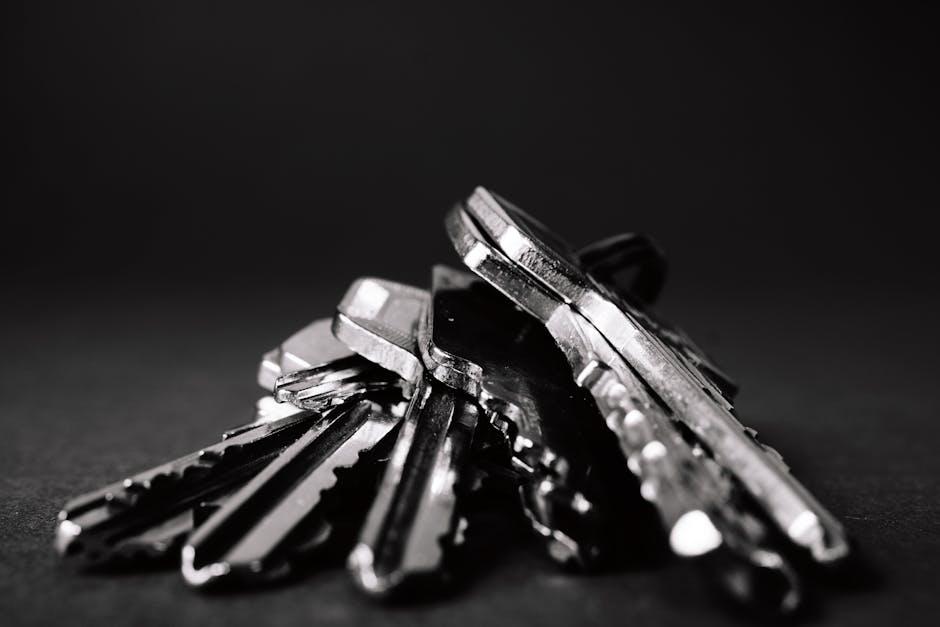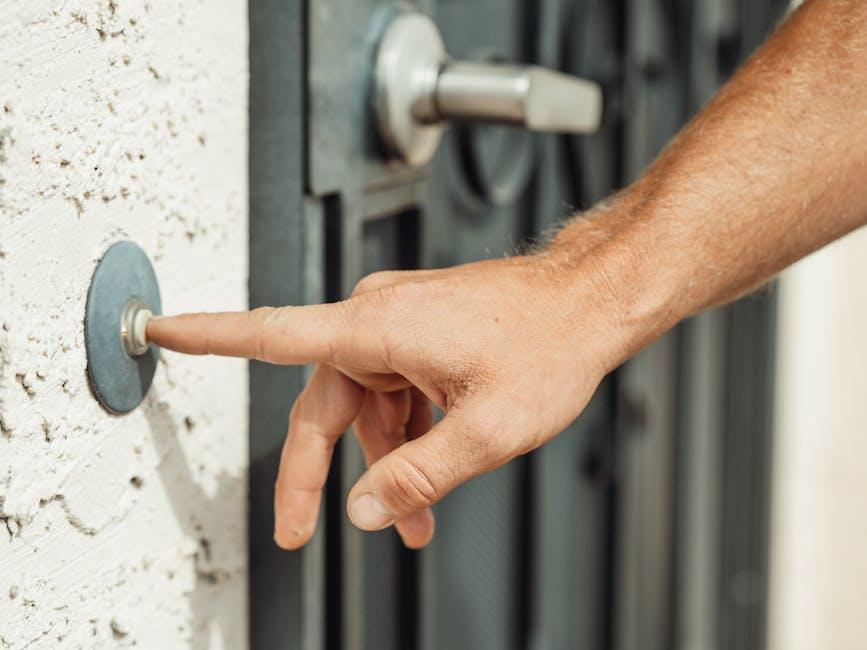Imagine standing at the threshold of your home, key in hand, contemplating a simple yet significant decision: should you rekey the lock or replace it entirely? Both options revolve around enhancing your security, but they offer distinctly different approaches. Understanding the nuances between rekeying and replacing a lock can empower you to make an informed choice that best suits your needs and budget. In this article, we’ll explore the key differences, benefits, and considerations of each method, unlocking the mystery behind these common, yet often misunderstood, security solutions.
Table of Contents
- Understanding the Basics of Rekeying and Replacing Locks
- When Rekeying Makes More Sense for Your Security Needs
- Situations That Call for a Full Lock Replacement
- Cost Considerations and Long-Term Benefits of Each Option
- Expert Tips for Choosing the Right Approach for Your Property
- Q&A
- The Conclusion

Understanding the Basics of Rekeying and Replacing Locks
When it comes to securing your home or business, it’s essential to understand the distinction between rekeying and replacing a lock. Rekeying involves changing the internal mechanism of the lock so that it responds to a new key, rendering old keys useless without altering the entire hardware. This option is not only cost-effective but also faster, making it an ideal choice when keys are lost or when you want to limit access without changing the lock’s appearance or structure.
On the other hand, replacing a lock means removing the entire unit and installing a new one. This process is often necessary when the lock is damaged, outdated, or you want to upgrade the level of security. Below is a quick comparison to help clarify your options:
| Aspect | Rekeying | Replacing |
|---|---|---|
| Cost | Lower | Higher |
| Time Required | Quick | Longer |
| Hardware Condition | Good | Damaged/Old |
| Security Upgrade | Limited | Significant |
| Aesthetic Change | None | Possible |
- Choose rekeying if you want to maintain your existing locks but disable old keys.
- Opt for replacement if your lock is compromised or you seek enhanced security features.

When Rekeying Makes More Sense for Your Security Needs

Situations That Call for a Full Lock Replacement
When the integrity of your security feels compromised, sometimes simply changing the pins inside your existing lock won’t cut it. A complete lock replacement becomes necessary if your lock is damaged beyond repair, such as after a break-in attempt or extreme wear and tear. Additionally, if you’ve recently moved into a new home and suspect that previous owners or others might have keys, starting fresh with a new lock is a wise decision to regain peace of mind.
Other key moments to consider replacing your lock include:
- Lost or stolen keys with no record of duplicates
- Outdated or faulty locks that no longer meet safety standards
- Upgrading to high-security or smart locks for enhanced protection
- Multiple rekeying attempts causing internal lock damage or malfunction

Cost Considerations and Long-Term Benefits of Each Option
When it comes to upfront costs, rekeying is often the more budget-friendly choice. Since this process involves altering the internal pins of your existing lock to work with a new key, it typically requires less labor and fewer parts than a full replacement. For homeowners on a tighter budget or those needing a quick security update, rekeying offers immediate peace of mind without breaking the bank. However, while economical at first, rekeying doesn’t refresh the physical hardware, so any existing wear, potential vulnerabilities, or outdated lock technology remain intact.
On the flip side, replacing a lock tends to be a higher initial investment but comes with significant long-term advantages. New lock installations often feature advanced security features, enhanced durability, and can sometimes offer aesthetic upgrades for your doors. Consider the following comparison to understand the cost-benefit dynamics:
| Factor | Rekeying | Replacing Lock |
|---|---|---|
| Initial Cost | Low to moderate | Moderate to high |
| Security Upgrade | Minimal (same hardware) | Significant (new technology) |
| Longevity | Limited by old hardware | Long-term solution |
| Customization | Key changes only | Style and function options |
Ultimately, the choice boils down to your priorities: if you value quick, cost-effective rekeying for immediate security, it’s a smart call. If you’re seeking robust security improvements and a lock that stands the test of time, investing in a new lock installation will likely pay dividends in the long run.

Expert Tips for Choosing the Right Approach for Your Property
When deciding between rekeying and replacing a lock, understanding your specific security needs is crucial. Rekeying is a cost-effective choice if you want to maintain the existing hardware but need to change who can access the property. It’s ideal for situations such as moving into a new home, losing a key, or after tenant turnover when you want the convenience of new keys without the hassle or expense of buying new locks. However, if your locks show signs of wear, are outdated, or you desire advanced security features, replacement might better serve you.
Consider factors such as the lock’s age, condition, and the level of security required. Here are a few points to help guide your decision:
- Cost: Rekeying is generally less expensive than full replacement.
- Security upgrade: Replacement offers the opportunity to install newer, more secure models.
- Convenience: Rekeying can be quicker and less disruptive.
- Durability: Older locks may not perform reliably even if rekeyed.
| Approach | Best For | Average Cost | Security Level |
|---|---|---|---|
| Rekeying | Changing key access | $20 – $50 | Moderate |
| Replacing | Upgrading or worn locks | $50 – $200+ | High |
Q&A
Q: What does it mean to rekey a lock?
A: Rekeying a lock involves changing the internal pins of the lock cylinder so that it works with a new key. The existing lock hardware stays the same, but the old keys will no longer operate the lock, giving you new key control without swapping out the entire lock.
Q: How is replacing a lock different from rekeying?
A: Replacing a lock means removing the entire lock hardware and installing a brand-new lock. This option is often chosen when the existing lock is damaged, outdated, or when you want to upgrade the security features, such as moving from a standard lock to a smart lock.
Q: When should I consider rekeying over replacing a lock?
A: Rekeying is ideal if you want to maintain your current lock set but need new key control-like after moving into a new home, losing keys, or after tenants move out. It’s usually quicker and more cost-effective than replacement.
Q: What are the benefits of replacing a lock instead of rekeying?
A: Replacing a lock can provide enhanced security with modern locking technologies, address lock damage or wear, and offer a fresh aesthetic. It’s the preferred choice if the lock is old or malfunctioning, or if you want to upgrade to features like keyless entry.
Q: Is rekeying always possible for every type of lock?
A: Not always. Some high-security or electronic locks don’t allow for traditional rekeying, as their mechanisms are more complex or integrated with digital systems. In these cases, replacement may be necessary.
Q: How do the costs of rekeying and replacing compare?
A: Rekeying generally costs less since it involves limited labor and parts. Replacing locks can be pricier due to the cost of new hardware and installation. However, if your lock needs an upgrade or repair, replacement might be a more valuable long-term investment.
Q: Can I rekey multiple locks to use one key?
A: Yes! Rekeying allows you to create a master key system where several locks operate with a single key, simplifying access without the expense of replacing all locks.
Q: Which option offers better security-rekeying or replacing?
A: Both options can be secure if done properly. Rekeying maintains the mechanical integrity of your current lock, while replacing allows you to upgrade to newer, potentially more secure lock models. Your choice depends on your security needs and lock condition.
Q: How long does it take to rekey or replace a lock?
A: Rekeying is often quicker, sometimes completed in under 30 minutes per lock by a professional. Replacing locks may take longer, especially if multiple locks or complicated installations are involved.
Q: Can I do rekeying or replacement myself?
A: Rekeying can be attempted by those with locksmith skills and proper tools, but mistakes can compromise security. Replacing locks is often more straightforward but still requires some know-how. When in doubt, professional locksmith services ensure the job is done safely and correctly.
The Conclusion
In the end, whether you choose to rekey or replace your lock depends on your unique needs and circumstances. Rekeying offers a cost-effective way to regain control without the hassle of new hardware, while replacing provides a fresh start with enhanced security features. Understanding the nuances of each option empowers you to make a decision that best fits your peace of mind-and keeps your home or business safely locked in place. After all, the key to security isn’t just the lock itself, but the knowledge you hold in your hands.





